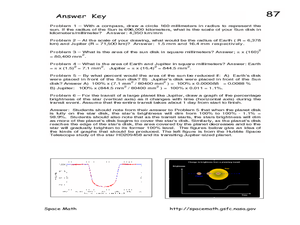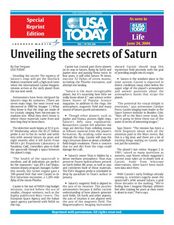American Museum of Natural History
Beyond Planet Earth
Scholars take a journey through space with 16 eye-catching images. Along the way, learners read captions starting with the moon, then move onto asteroids, Mars, and Jupiter.
American Museum of Natural History
Cosmic Cookies
Scholars read about each planet then bake a plate of cosmic cookies—no-bake cookies decorated to look like the planets; Mercury, Venus, Earth, Mars, Jupiter, Saturn, Uranus, Neptune, and Pluto.
Curated OER
Jupiter
A student-produced PowerPoint provides basic facts about the planet of Jupiter. Illustrated slides highlight its physical attributes and satellites. A lot of interesting information about Jupiter is included, such as the fact that twenty...
Curated OER
On Jupiter
Students tour Jupiter. In this scenario based lesson, students examine the size of Jupiter and make models of the other planets in the solar system to show how large Jupiter is compared to the other planets.
Curated OER
The Planets in Our Solar System
Students gain knowledge about earth and space science by studying the nine planets in the solar system as well as their key characteristics. In this solar system lesson, students identify the nine planets. Students work in groups to...
Curated OER
Planets Curriculum
Students complete an in-depth study of the known planets in the solar system. As a class, students identify the planets that are known in the universe, in the night sky. They explain the differences between planets and stars and the...
Curated OER
Planets Curriculum
Pupils investigate the planets in our solar system. They conduct research using a variety of resources in order for students to make cognitive connections with the demonstrations made by the teacher. Pupils discover how to recognize the...
Curated OER
Kepler-The Hunt for Earth-like Planets
In this hunt for planets worksheet, learners read about the Kepler satellite used to detect exoplanets. Students solve 6 problems including drawing a sun disk and determining the scale in kilometers/millimeter, finding the area of the...
SciShow Kids
Let's Make the Solar System
Get crafty with the help of pictures and a real-time demonstration from a video that details the step-by-step process in creating a paper solar system.
Curated OER
Be A Planet
Students identify the name, order and attributes of the planets. They role play the position of planets, and draw pictures of the planets as well.
Curated OER
Volcanoes in Space
Students research volcanoes on the Internet to compare/contrast the volcanoes on Earth to the ones found on Io, a moon of Jupiter. Students list the similarities and differences in science journals, and illustrate pictures of the volcanoes.
Research Parent
Solar System Cards
Find all things solar system in a set of reference cards. Even Pluto makes an appearance! Each of the 24 cards has a picture and accompanying informational text that gives brief background about the object.
American Museum of Natural History
Cosmic Connection
Do you see what I see? Individuals view eight images from the Hubble Space Telescope and then determine exactly what is being shown in the images. The pictures range from the rings of Saturn to views of billions of galaxies that take up...
Curated OER
Our Changing View of the Solar System
Students identify and name the eight planets and the five dwarf planets in our solar system. In this space science lesson, students view a slideshow of the planets and label them on an included Solar System chart.
Curated OER
Solar System Search
Students learn the names of the nine planets. They are then given a worksheet which they use to identify the planets based on actively listening to the teacher's oral description. This is a great listening activity.
Curated OER
Our Solar System
Students study the Earth and Solar System through a variety of activities. They compile a coloring book show the characteristics of the Sun and nine planets.
American Museum of Natural History
Solar System Scavenger Hunt
Scholars go on a hunt to locate objects that best fit the measurements to create an eye-catching scale model of the solar system.
Curated OER
The Planet Saturn
In this worksheet on the planet Saturn, students look at a picture of the planet and read accompanying facts, along with a brief paragraph.
Star Date
Modeling the Night Sky
Dramatize the stars and planets as they become a visual representation of the solar system in this activity. Young astronomers track and simulate various constellations as they orbit the Earth to learn the position and motion of objects...
Mrs. Sol's Class
Solar System Project
Finish or launch your unit on the solar system with a jigsaw project covering major celestial concepts such as the Milky Way Galaxy, asteroids, meteors, comets, Earth's moon, and, of course, all the planets. Learners start by writing...
Curated OER
Sky Watching
Students explain how our knowledge of the sky has been enhanced by telescopes. They make their own night-sky observations, diagram and describe what they see, and examine pictures taken by telescopes.
Curated OER
Asteroids!
Middle schoolers explore how to visually identify asteroids in SDSS images. They are able to explain that stars are so far away that they do not appear to move, even over the course of a human lifespan. Students identify the location...
Curated OER
Unveiling the Secrets of Saturn
Students read and study an article then answer questions on Saturn. In this investigative lesson students identify ways space exploration has helped humanity and then they search the Internet for space pictures and sketch a drawing of...
International Technology Education Association
Pixel This!
Did the image I drew match the image you saw? By simulating a satellite and a ground station, teams of two transmit data in the form of pixels in order to recreate an image. They use four different levels of brightness, creating slightly...

























